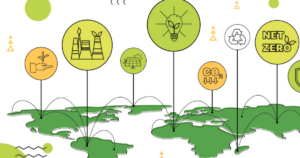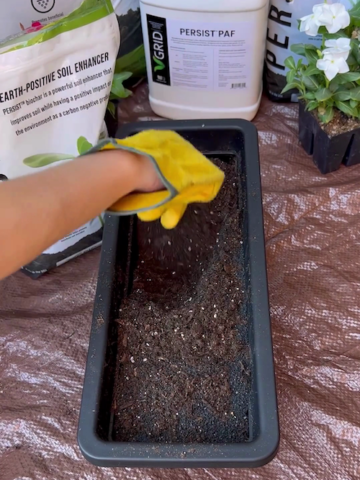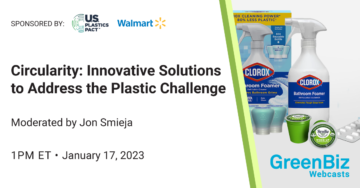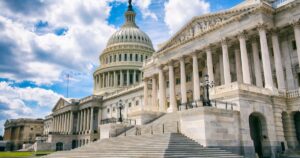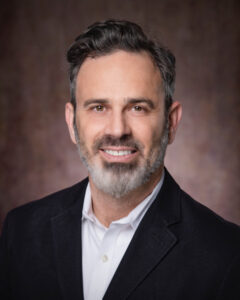Seattle is one of a growing number of cities globally embracing the principles of a circular economy — one that prioritizes the reduction of wasteful consumption habits and lifts up models centered on reuse, repair, refurbishment or remanufacture.
The motivations are manifold, helping urban communities cut waste and also providing new opportunities for economic development — as much as $4.5 trillion in new value, according to projections by Accenture.
Here are three ways Seattle is exploiting that potential as part of its broader climate and environmental programs.
1. Circularity is core to its latest 5-year strategy plan
It’s notable that circular economic principles are baked into the five-year strategic business plan for Seattle Public Utilities (SPU), which launched in 2021 and is in effect through 2026. The city sees the circular economy as vital in addressing biodiversity loss, conserving water and other resources, and creating new jobs that benefit more members of the community. Principles of circularity can be found in every citywide strategy in that plan, including its food and climate action plans and its business development initiatives.
Among other things, Seattle has adopted a Sustainable Purchasing Strategy that prioritizes the purchase of products that use post-consumer recycled content. It has also doubled down on agency partnerships that advance the adoption of on-site water reuse systems that capture and “recycle” water for non-potable applications. One example would be capturing rainwater stormwater runoff and using it for maintenance of landscape or industrial cooling equipment.
Notably, it has adopted a number of statutes that are forcing the issue. For example, as part of the roadmap, the city requires salvage assessment for all demolition projects and major commercial renovations and retrofits. Recyclable building materials are banned from the city’s landfills, and Seattle is piloting a financial incentive for homeowners that aims to increase deconstruction versus demolition.
2. It’s creating targeted policies
Those mandates are inspiring the relaunch this summer of the Washington Materials Marketplace, a two-year-old online exchange promoting reuse of products and materials in the Pacific Northwest.
The initiative is one of a half-dozen such networks operating quietly in Michigan, Tennessee, Ohio, Ontario and Austin, Texas — with a long-term mission of nurturing the reuse of reclaimed items and keeping them out of municipal waste streams. At the time of its launch in August 2021, the Washington Materials Marketplace had already diverted more than 17 million pounds of stuff from landfills — ranging from computer monitors to fixtures to unneeded chemicals — generating about $1.6 million for local businesses in the process.
Now under the direction of Chicago-based circular economy startup Rheaply, the exchange is being reimagined with a more specific focus on reclaimed materials related to the built environment — including deconstructed buildings, commercial furniture, fixtures and equipment, according to a Rheaply executive and local Washington-state officials closely involved in the region’s circular economy programs.
“The original program was more scattershot, but we see a tremendous opportunity by focusing on construction and demolition debris,” said Robert Duff, sustainable business development director at the Washington State Department of Commerce. “The idea is to be a clearinghouse for items that shouldn’t be bashed into little pieces and placed in a hopper.”
Rheaply’s role is, essentially, one of network facilitator. In Washington state, it is refining the online platform used by potential sellers to make potential buyers aware of available items. Rheaply hopes to connect general contractors, developers, product manufacturers, architects and entrepreneurs focusing on building deconstruction and salvage, according to Daniel Kietzer. He’s director of sustainability at Rheaply and a former executive with the U.S. Business Council for Sustainable Development, one of the original partners behind the exchange along with the Seattle Good Business Network.
The building statutes and other legislation in both the Seattle region and Washington state have made this sort of activity more possible and desirable, he said. “It would have been difficult to get this done, otherwise.”
Beyond buildings, Seattle’s municipal policies related to circularity include ordinances that ban expanded polystyrene foam foodware and single-use plastic bags. It has policies that cover food waste prevention and “rescue”; food and beverage container reuse at businesses, event venues, schools and other locations through the citywide Reuse Seattle effort; and composting, including the development of markets that encourage the use of compost created from Seattle’s organic waste by local landscapers and farmers.
The city is also an advocate for both extended producer responsibility, which puts the onus on manufacturers to manage packaging waste, minimum requirements for the use of recycled content and right to repair laws that make it easier for people to fix, rather than replace, broken or old products.
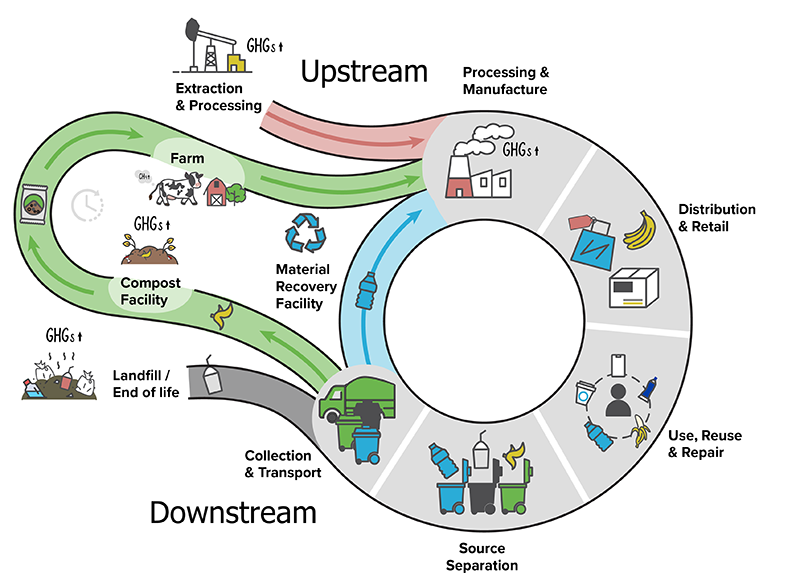
![]()
![]()
![]()
![]()
![]()
![]()
![]()
3. It’s putting money behind its aspirations
Another program aimed at buoying support for the local circular economy in Seattle is NextCycle Washington, which last month awarded more than $400,000 in grants to businesses and nonprofits developing business or operational models that support that agenda. The program is funded by the King County Solid Waste Division, the Washington Department of Ecology and the Washington Department of Commerce
“We can actually incorporate a circular mindset with these next-generation businesses …. Everything is integrated,” Duff said. More than 72 percent of the new grant money is going to organizations led by women, veterans, disabled individuals or those who identify as LGBTQIA2+ or as Black, Indigenous or people of color.
Not coincidentally, several projects supported by the grants are focused on circular buildings, including Bennion Construction in Lake Forest Park, a deconstruction services firm; Sledge Seattle in Mill Creek, which is researching ways to re-mill reclaimed old growth lumber; and Zero Waste Washington in Seattle, which is developing methods to rescue and repair damaged furniture.
Underpinning the role that digital technology and software will play in enabling circularity, a number of grantees are building online marketplaces or apps aimed at encouraging reuse, including Community Gearbox of Bainbridge Island and GeerGarage of Seattle (which both support sharing outdoor gear and other items), and Pumped Bellingham, which is launching a refill program for self-care products.
- SEO Powered Content & PR Distribution. Get Amplified Today.
- PlatoAiStream. Web3 Data Intelligence. Knowledge Amplified. Access Here.
- Minting the Future w Adryenn Ashley. Access Here.
- Buy and Sell Shares in PRE-IPO Companies with PREIPO®. Access Here.
- Source: https://www.greenbiz.com/article/3-smart-ways-seattle-forefront-reuse
- :has
- :is
- $UP
- 000
- 15%
- 17
- 17 million
- 2021
- 2026
- 72
- 8
- a
- About
- Accenture
- According
- Action
- activity
- actually
- addressing
- adopted
- Adoption
- advance
- advocate
- agency
- agenda
- aimed
- aims
- All
- along
- already
- also
- an
- and
- applications
- apps
- ARE
- article
- AS
- assessment
- At
- AUGUST
- austin
- available
- awarded
- aware
- bags
- Ban
- banned
- BE
- been
- behind
- being
- benefit
- BEVERAGE
- Black
- both
- broader
- Broken
- Building
- Building Materials
- built
- business
- business development
- businesses
- but
- buyers
- by
- CAN
- capture
- Capturing
- centered
- chemicals
- circular economy
- Cities
- City
- click
- Climate
- climate action
- closely
- color
- Commerce
- commercial
- Communities
- community
- computer
- Connect
- construction
- consumption
- Container
- content
- continue
- contractors
- Core
- Council
- county
- cover
- created
- Creating
- Creek
- Cut
- cycle
- Daniel
- data
- Department
- developers
- developing
- Development
- dialogue
- difficult
- digital
- digital technology
- direction
- Director
- disabled
- Division
- done
- doubled
- down
- easier
- Economic
- Economic Development
- economy
- effect
- effort
- embracing
- enabling
- encourage
- encouraging
- entrepreneurs
- Environment
- environmental
- equipment
- essentially
- Ether (ETH)
- Event
- Every
- everything
- example
- exchange
- executive
- expanded
- facilitator
- farmers
- financial
- Firm
- Fix
- Foam
- Focus
- focused
- focusing
- food
- For
- forefront
- forest
- Former
- found
- from
- funded
- Gear
- General
- generating
- get
- Globally
- going
- good
- grant
- grants
- Growing
- Growth
- had
- Have
- he
- helping
- hopes
- HTTPS
- idea
- identify
- in
- Incentive
- include
- Including
- incorporate
- Increase
- individuals
- industrial
- Initiative
- initiatives
- inspiring
- integrated
- into
- involved
- island
- issue
- IT
- items
- ITS
- Jobs
- june
- keeping
- King
- lake
- landscape
- Last
- latest
- launch
- launched
- launching
- Laws
- Led
- Legislation
- Life
- little
- local
- local businesses
- locations
- long-term
- loss
- made
- maintenance
- major
- make
- manage
- mandates
- Manufacturers
- marketplace
- marketplaces
- Markets
- materials
- Members
- methods
- Michigan
- million
- Mindset
- minimum
- Mission
- models
- money
- monitors
- Month
- more
- motivations
- move
- much
- municipal
- network
- networks
- New
- next-generation
- node
- nonprofits
- notable
- number
- of
- officials
- Ohio
- Old
- on
- ONE
- online
- online marketplaces
- Ontario
- operating
- operational
- opportunities
- Opportunity
- or
- organic
- organizations
- original
- Other
- otherwise
- out
- Outdoor
- Pacific
- packaging
- Park
- part
- partners
- partnerships
- People
- percent
- pieces
- Place
- plan
- plans
- plastic
- platform
- plato
- Plato Data Intelligence
- PlatoData
- Play
- policies
- possible
- potential
- pounds
- presentation
- Prevention
- principles
- process
- producer
- Product
- Products
- professionals
- Program
- Programs
- projects
- promoting
- providing
- public
- purchase
- purchasing
- Puts
- Putting
- quietly
- ranging
- rather
- reduction
- refining
- region
- reimagined
- related
- relaunch
- repair
- replace
- Requirements
- requires
- rescue
- Resources
- responsibility
- reuse
- right
- roadmap
- ROBERT
- Role
- s
- Said
- Schools
- Seattle
- see
- sees
- Sellers
- Services
- several
- sharing
- smart
- Software
- solid
- specific
- startup
- State
- State Department
- Strategic
- strategic business
- Strategy
- streams
- such
- summer
- support
- Supported
- Sustainability
- sustainable
- Sustainable Development
- Systems
- taking
- targeted
- Technology
- texas
- than
- that
- The
- Them
- These
- things
- this
- those
- three
- Through
- time
- to
- tremendous
- Trillion
- u.s.
- under
- urban
- use
- used
- using
- utilities
- value
- venues
- Versus
- Veterans
- vital
- was
- washington
- washington state
- Waste
- Water
- ways
- we
- which
- WHO
- will
- with
- Women
- would
- zephyrnet
- zero



